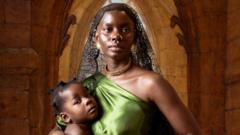Dola Posh has multiple identities: Photographer; woman; Nigerian; mother; Briton. Yet after giving birth, she no longer felt sure who she was. Six days after her daughter was born, she was lying in a bed in an English hospital, in the midst of a COVID lockdown. She worried about how her life had changed and if she would ever again do what she loved - taking pictures. Unable to visit, relatives kept calling to check on her and the baby. After a difficult pregnancy, Dola felt under pressure. Her mother was thousands of miles away in Lagos, Nigeria's largest city. All this put her “brain in a very dark place... I thought: ‘I’m me; the baby’s out, I’m still me.’ But no, I wasn’t me anymore.”
The loss of identity can be one of the causes of postnatal depression, which disproportionately affects Black women. Though she did not recognize it at the time, this was what Dola was suffering from. After being discharged from the hospital, she was bombarded with unsolicited advice about motherhood. “There was too much talk, too much control around how I should raise the child. It made me feel like I didn’t know what I was doing. I wasn’t given the chance to be a mother.”
At 33 years old, Dola speaks about the distressing events of 2020 with a matter-of-factness that belies the tears she has shed. One night, overwhelmed with fatigue and the monotony of her existence, a voice in her head whispered that taking her life seemed like an option. Clinging to her blanket like a lifeline, Dola found solace beside Monioluwa, whose name translates to “I have God” in Yoruba, as she sang traditional songs from her homeland.
In a moment of vulnerability, she reached out to her health visitor, who reassured her and encouraged her to seek therapy. This pivotal step opened the door to using her photography to navigate through the tumultuous emotions she was experiencing. Dola, known in Nigeria for her striking portrait work, shifted her lens onto herself. Using a phone app to operate her camera remotely, she began crafting a series that depicted intimate moments with Monioluwa.
These mother-and-child portraits drew upon historical representations of the Madonna in Western art, an influence Dola later recognized. Raised in a deeply religious family, she often saw those images on church walls and religious texts. “Sometimes you do things, you don’t even know why you do them,” she reflects, acknowledging how her upbringing played a subconscious role in her art.
The veil she wore as part of her church attire naturally found its place within her work, becoming a symbol of her identity rather than an emblem of emptiness. Every photograph helped her reconnect with her roots, reinforcing a sense of familial essence and identity. Sharing her story of motherhood—complete with its challenges and the reality of her postnatal depression—allowed her to shed the shame she felt.
Dola mentions that her narrative reflects a serious need for awareness and representation. “Now I am working on the stories of what actually happened and the darkness, how I crawled out of it,” she expresses. Her advocacy earned her recognition in the form of an award from camera manufacturer Leica, enabling her to continue her important work and uplift other women facing similar struggles.
“My vision is a world where Black mothers don’t feel burdensome, nor alone. I want them to see themselves in the media as they navigate this journey,” she asserts. Studies show that in the UK, Black women are more vulnerable to experiencing postnatal depression due to various intertwined factors. Dola believes that openness is the key to battling this issue.
“It’s new for a woman to stand there and say: ‘I almost ended my life, I’m not ashamed of it – I am still an artist, I am still a woman, and I have something to say.’” By sharing her story and work, Dola Posh opens doors for conversations around mental health, cultivating strength and support among Black mothers everywhere. If you feel affected by the issues mentioned in this article, support resources are available through NHS and other organizations focused on mental health.




















